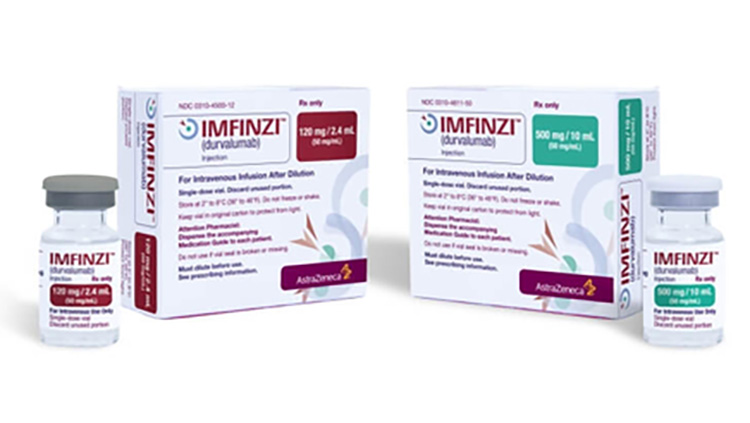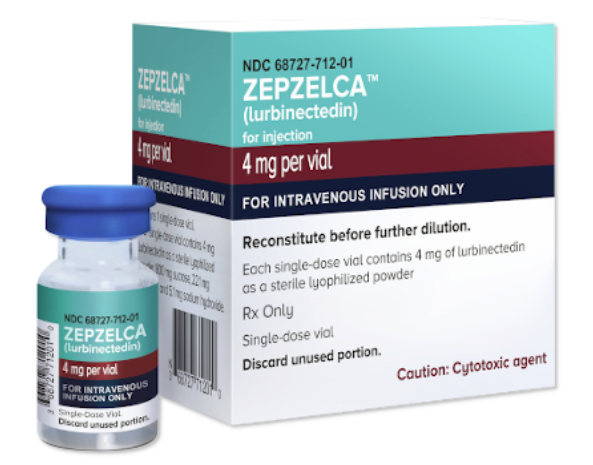Imfinzi (durvalumab) vs Zepzelca (lurbinectedin)
Imfinzi (durvalumab) vs Zepzelca (lurbinectedin)
Imfinzi (durvalumab) is an immune checkpoint inhibitor that works by helping the immune system recognize and attack cancer cells, and it is commonly used in the treatment of certain types of lung cancer, such as non-small cell lung cancer (NSCLC), and bladder cancer. Zepzelca (lurbinectedin) is a newer anticancer medication that functions as an alkylating agent, interfering with the growth of cancer cells, and is specifically approved for the treatment of metastatic small cell lung cancer (SCLC) after prior platinum-based chemotherapy. When deciding between these medications, it is crucial to consider the specific type of lung cancer being treated and previous treatments, as Imfinzi is typically used for NSCLC and certain other cancers, while Zepzelca is targeted for SCLC.
Difference between Imfinzi and Zepzelca
| Metric | Imfinzi (durvalumab) | Zepzelca (lurbinectedin) |
|---|---|---|
| Generic name | Durvalumab | Lurbinectedin |
| Indications | Urothelial carcinoma, non-small cell lung cancer | Small cell lung cancer |
| Mechanism of action | PD-L1 inhibitor, immune checkpoint inhibitor | Alkylating agent, inhibits transcription |
| Brand names | Imfinzi | Zepzelca |
| Administrative route | Intravenous | Intravenous |
| Side effects | Fatigue, musculoskeletal pain, constipation, decreased appetite, nausea, peripheral edema, urinary tract infection, fever | Fatigue, leukopenia, lymphopenia, anemia, increased creatinine, increased alanine aminotransferase, increased glucose, nausea, constipation, decreased appetite |
| Contraindications | Hypersensitivity to durvalumab or any of its excipients | Hypersensitivity to lurbinectedin or any of its excipients |
| Drug class | Antineoplastic, monoclonal antibody | Antineoplastic, alkylating agent |
| Manufacturer | AstraZeneca | Pharma Mar |
Efficacy
Imfinzi (Durvalumab) in Lung Cancer Treatment
Imfinzi (durvalumab) is a monoclonal antibody that is part of a class of cancer treatments known as immune checkpoint inhibitors. Specifically, it targets the PD-L1 protein found on the surface of tumor cells and immune cells. By blocking the interaction between PD-L1 and PD-1 receptors, Imfinzi helps the immune system to detect and attack cancer cells. In the context of lung cancer, durvalumab has shown efficacy in the treatment of unresectable, Stage III non-small cell lung cancer (NSCLC) following chemoradiation therapy. Clinical trials have demonstrated that durvalumab can significantly improve median progression-free survival compared to placebo, leading to its approval in this indication.
Zepzelca (Lurbinectedin) and Its Role in Lung Cancer
Zepzelca (lurbinectedin) is a newer chemotherapeutic agent that acts as an alkylating drug, which binds to the DNA in cancer cells, inhibiting their ability to divide and grow. It has been granted accelerated approval for the treatment of adults with metastatic small cell lung cancer (SCLC) with disease progression on or after platinum-based chemotherapy. Studies have shown that lurbinectedin can lead to a significant percentage of patients achieving an objective response rate, meaning that their tumors shrank or disappeared after treatment. The duration of these responses has also been a point of interest, with some patients experiencing prolonged periods of disease stability.
Comparative Efficacy in Lung Cancer Management
While both Imfinzi and Zepzelca are used in the treatment of different forms of lung cancer, their efficacy is dependent on the specific type and stage of the disease. Imfinzi has become a standard of care for Stage III NSCLC patients who are not candidates for surgery and have completed chemoradiation, based on its ability to delay disease progression. On the other hand, Zepzelca is used in a different subset of lung cancer patients—those with metastatic SCLC who have experienced progression after initial chemotherapy. The efficacy of Zepzelca in this setting provides a much-needed option for a group of patients with historically limited treatments available after first-line therapy.
Conclusion
In conclusion, both Imfinzi and Zepzelca have shown efficacy in the treatment of lung cancer, albeit in different subtypes and stages of the disease. Imfinzi's role in improving progression-free survival in Stage III NSCLC has been a significant advancement, while Zepzelca's ability to induce tumor responses in metastatic SCLC offers hope in a challenging treatment landscape. As with all cancer treatments, the efficacy of these drugs can vary from patient to patient, and ongoing research continues to refine their use and identify the populations that will benefit most from these therapies.
Regulatory Agency Approvals
Imfinzi
-
European Medical Agency (EMA), European Union

-
Food and Drug Administration (FDA), USA

-
Health Canada

-
Therapeutic Goods Administration (TGA), Australia

-
Medsafe (NZ)

Zepzelca
-
Food and Drug Administration (FDA), USA

Access Imfinzi or Zepzelca today
If Imfinzi or Zepzelca are not approved or available in your country (e.g. due to supply issues), you can access them via Everyone.org.
How it works

Make an enquiry
Choose the medicine you want to buy, answer a couple of questions, and upload your prescription to speed things up. We’ll get back to you within 24 hours.


Make an enquiry
Choose the medicine you want to buy, answer a couple of questions, and upload your prescription to speed things up. We’ll get back to you within 24 hours.


Breeze through the paperwork
We'll guide you through the required documents for importing unapproved medicine, ensuring you have all the necessary information.


Get a personalized quote
We’ll prepare a quote for you, including medicine costs and any shipping, administrative, or import fees that may apply.


Receive your medicine
Accept the quote and we’ll handle the rest - sourcing and safely delivering your medicine.

Some text on this page has been automatically generated. Speak to your physician before you start a new treatment or medication.
Let's talk
If you have any questions, call us or send us a message through WhatsApp or email:
Contact us




